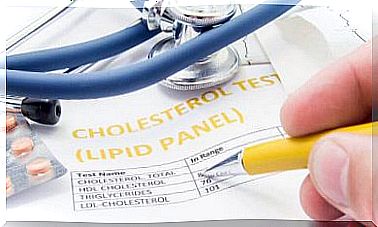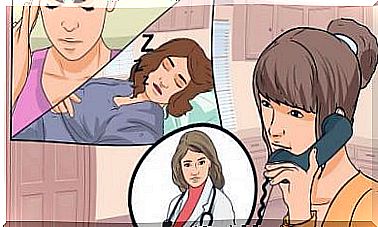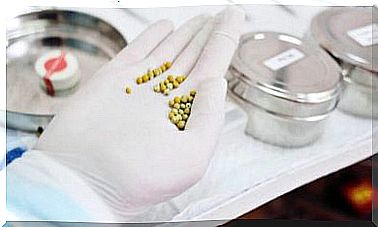Situations Where You Should Avoid Breastfeeding

The World Health Organization (WHO) recommends that infants drink only breast milk until they are about 6 months old. However, there are situations where you should avoid breastfeeding. Here we will explain some of these reasons to you.
7 situations in which you should avoid breastfeeding
In general, mothers can breastfeed their babies even when they are sick. However, this does not apply to any of the diseases or situations that we will describe below. They should also not breastfeed if it is life-threatening or if they are taking medicines that can be passed on through breast milk.
The Marina Alta Hospital in Denia, Spain, has even created a website on the compatibility of several common medicines for certain diseases with breastfeeding. This includes conditions such as:
- flu
- angina pectoris
- gastroenteritis
- bladder infection
However, what happens if a mother has to be hospitalized or has a serious infection? Here below we will discover the situations in which you should avoid breastfeeding.
1. Human T-cell Leukemia

Human T-cell leukemia is caused by a retrovirus. Once such a virus has infected a cell, it uses an enzyme to convert its RNA into DNA. Here it mixes with the host cell’s DNA and begins to multiply. This virus can be passed on from the mother to the baby through breastfeeding.
2. HIV virus
It has been proven that the HIV virus passes into breast milk. Therefore, it is better to avoid breastfeeding if you have this virus. However, researchers are studying different ways in which HIV-positive mothers can still breastfeed safely. These options require further research.
3. Galactosemia
This disease is characterized by the baby’s inability to digest galactose, one of the sugars that make up lactose in breast milk. It is a rare hereditary disease that can seriously damage the child’s liver and central nervous system.
There are several variants of galactosemia, but they are very difficult to diagnose. While people with peripheral or intermediate galactosemia can consume certain amounts of galactose, many doctors will recommend avoiding breastfeeding. This is because it is not possible to determine the exact variant of the disease.
4. Avoid Breastfeeding During a High-Risk Pregnancy

Another situation where you should avoid breastfeeding is if your pregnancy is high risk. If your pregnancy isn’t risky, doctors generally agree that you can breastfeed. However, if there is bleeding or possible preterm labor, doctors usually tell you not to breastfeed.
5. Cytomegalovirus
The data on whether you should avoid breastfeeding if you are a carrier of the cytomegalovirus is controversial. Some studies show that passing this virus through breast milk can cause serious harm in premature babies. However, there is no conclusive information about this.
Research also shows that freezing breast milk can help deactivate the virus and allow babies to feed safely. Talk to your doctor if you are a carrier of this virus if you want to breastfeed.
6. Taking Certain Medications
Taking certain medications on a regular basis usually means you should avoid breast-feeding. This is the case, for example, in people who use medication such as:
- anxiolytics
- antiretrovirals
- medication for migraine
- sleeping pills
The same goes for chemotherapy. Always consult your doctor first to get a well-considered opinion about your personal situation and the (im)possibilities.
7. Addictions
Having an alcohol or drug addiction are two situations in which you should avoid breastfeeding. In fact, it’s recommended that you completely stop using alcohol and drugs before trying to conceive.
Diseases That Don’t Mean You Should Avoid Breastfeeding

Diseases other than those listed above should not prevent breastfeeding unless there is a medical contraindication . Always consult your doctor if you suffer from any of the following diseases:
- Hepatitis: Both hepatitis B and C cannot be passed on through breast milk. When the mother is a carrier of hepatitis B, the newborn usually receives the vaccine against the disease and the specific immunoglobulin to prevent infection.
- Chagas disease: the data on this are inconclusive. However, the latest WHO studies show that mothers with this disease do not have to stop breastfeeding. Consult with your doctor about the latest insights!
- Mastitis: Inflammation of the mammary gland is common in nursing mothers. You don’t have to stop breastfeeding. In fact, sucking the baby helps to solve the problem.
- Tuberculosis: According to data from the Spanish Pediatric Association, breastfeeding is not a problem with this condition.
- Chickenpox: Doctors usually recommend continuing to breastfeed and monitor the newborn. It is even possible to give the baby the chickenpox vaccine.
- Breast surgery: If you have had breast surgery to enlarge or reduce it, you can generally breastfeed without any problems. Milk production naturally varies from woman to woman.
Asthma, allergies, hiccups and hyperthyroidism are also not diseases that mean you should avoid breastfeeding. As we always tell you, you should consult your doctor about your particular situation. No one can advise you better than your own doctor.









